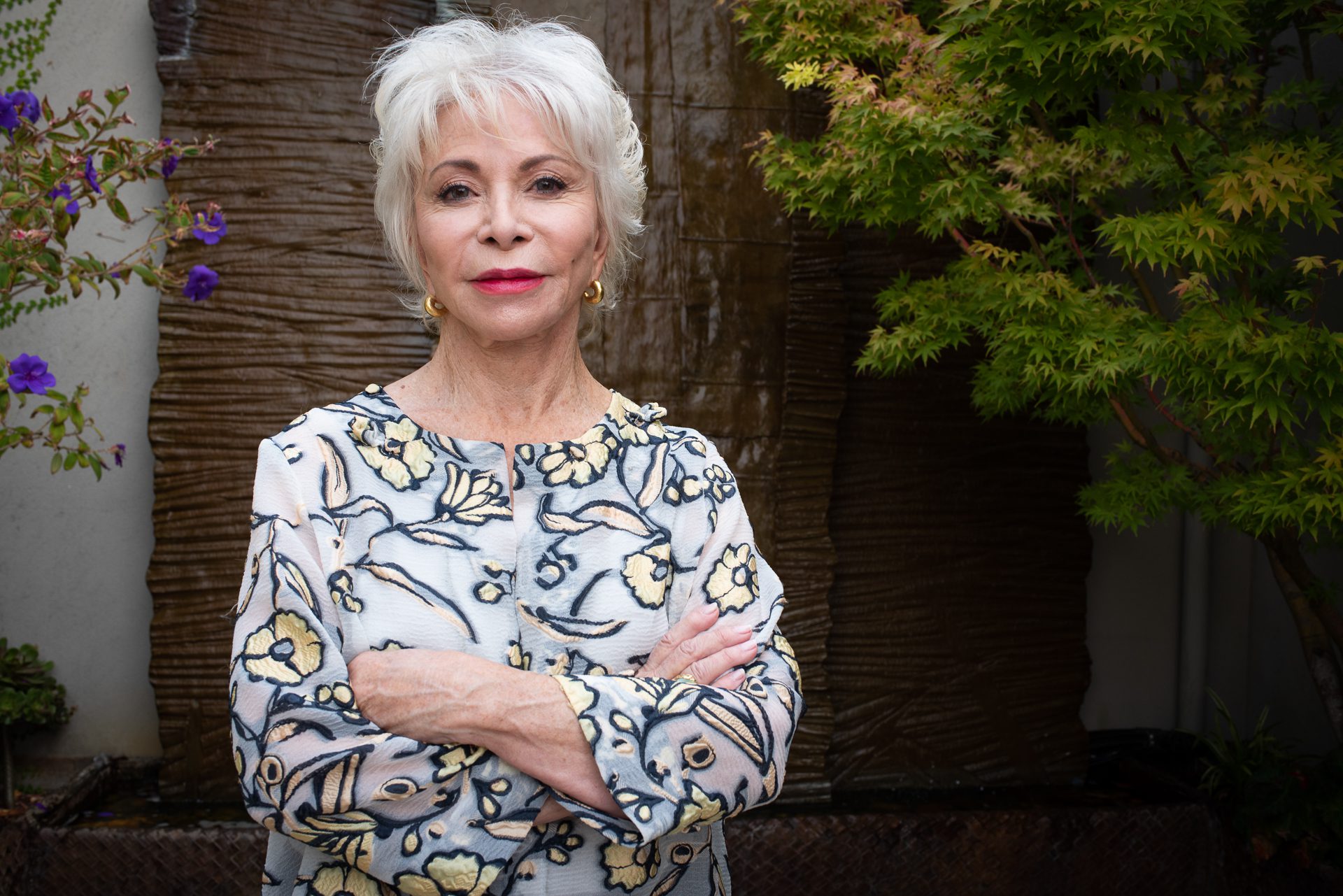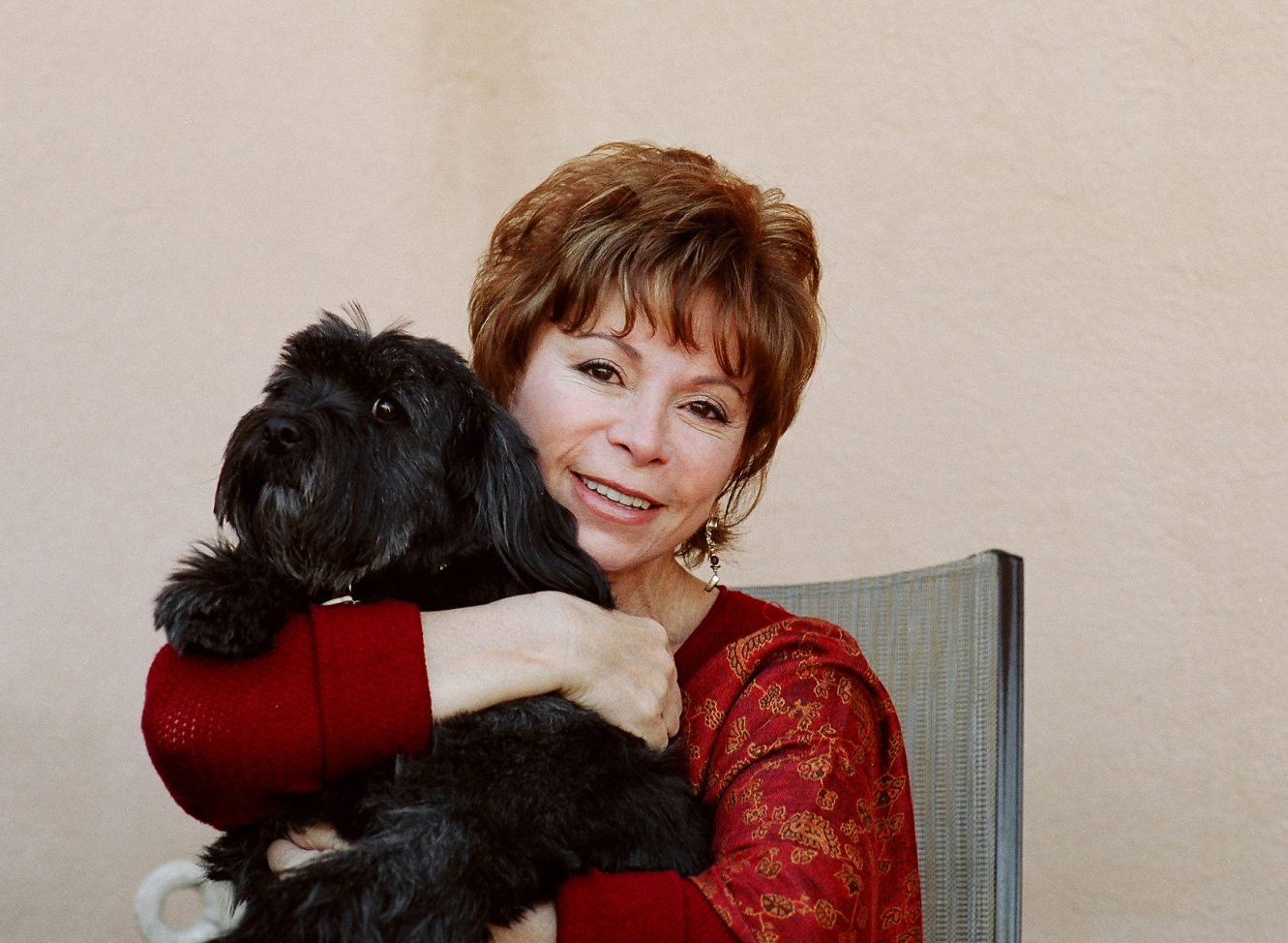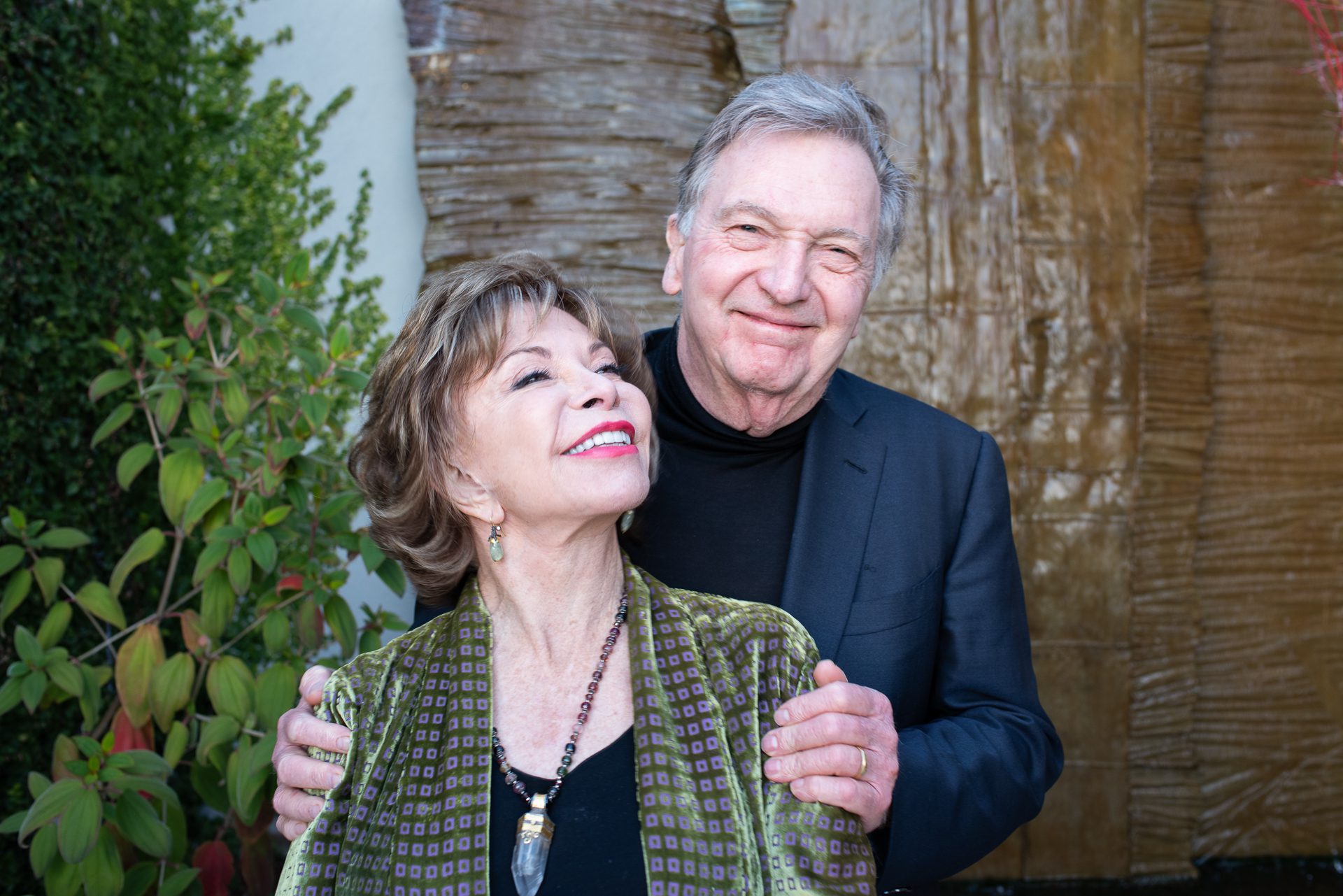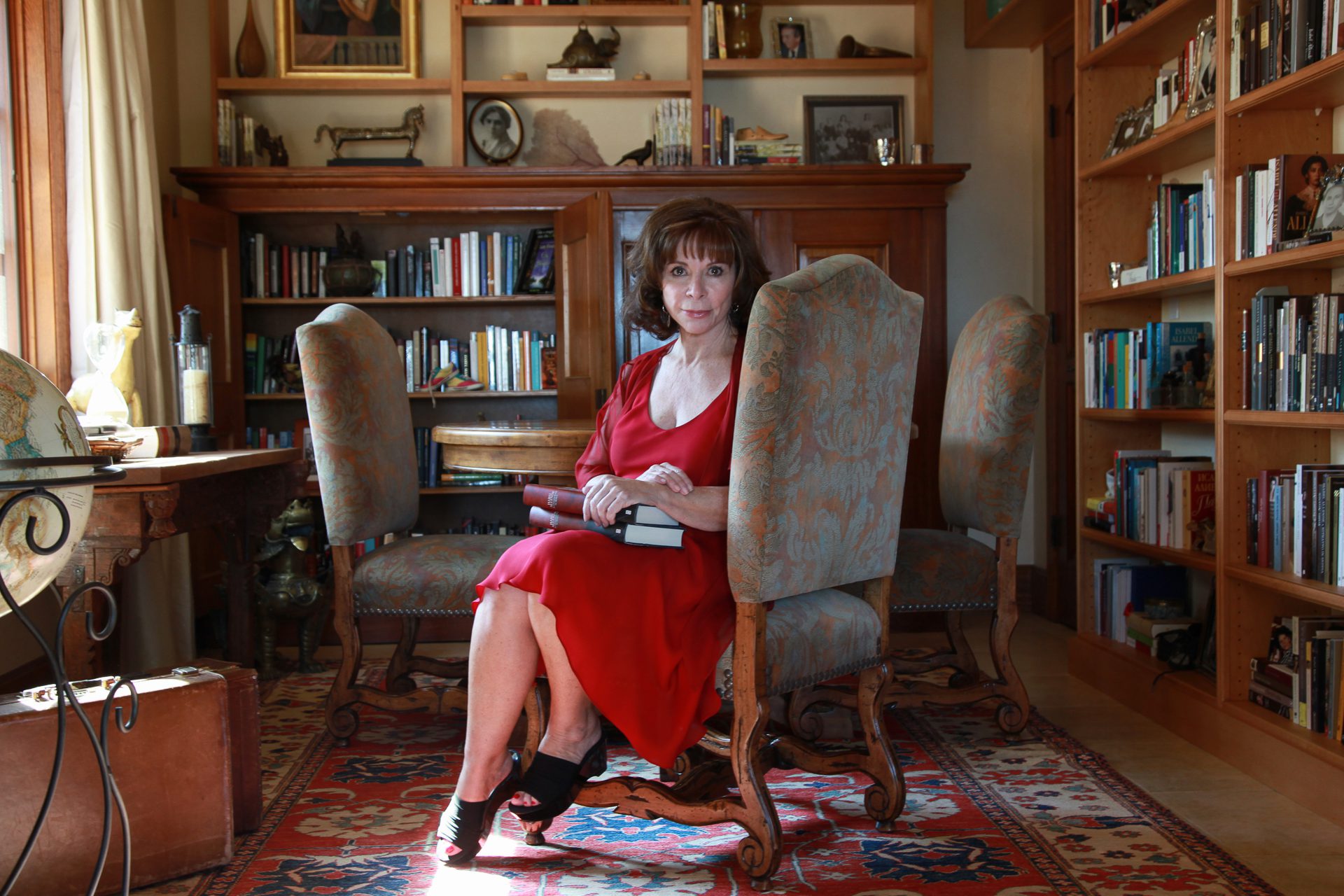 Photo by Lori Barra
Photo by Lori BarraThe best-selling Chilean author talks about her new book and the importance of telling immigration stories.
Chilean novelist Isabel Allende published her latest book this month, “The Wind Knows My Name.” The writer, who is also a well-known feminist and philanthropist, has sold over 77 million copies of her 26 critically-acclaimed books. Her work has been translated into more than 42 languages.
News that puts power under the spotlight and communities at the center.
Sign up for our free newsletter and get updates twice a week.
At 80, Allende says she has become comfortable saying “No,” something she had to learn with time and struggle. “I used to feel constantly obligated to follow someone else’s agenda, so now I only do what I like. I like to be at home, read, be with my husband, with my dogs, and watch a good television program. I like to cook, go have a drink sitting in front of the lagoon. I like to research and work on my book.”
Allende is based in the United States, where she runs The Isabel Allende Foundation. The foundation advocates for women and girls education, economic independence, safety and reproductive rights with a focus on immigrant women. It was through her philanthropy that she encountered a story similar to the one she shares in her new book.

In “The Wind Knows My Name,” Allende takes the reader on a cross-generational journey with Samuel Adler, a young Jewish boy fleeing from Nazi-occupied Austria at the dawn of World War ll, and Anita Díaz, a blind seven-year-old girl from El Salvador who loses her mother on her journey to a safe heaven in the United States.
Alongside their stories we meet Selena Durán, a social worker determined to help Anita find her mother. Allende intertwines their stories with empathy, compassion and her unique narrative ability. This book is a love letter for children who have been displaced, who have felt the anguish and the horrors that her protagonists are forced to bear, but also a critique of immigration policy in today’s United States.
Borderless spoke to Allende about her book, living in exile and the importance of perspective when telling stories about immigration.
What inspired you to write “The Wind Knows My Name?”
About a year ago, I started with the idea of writing about this topic, and then I spoke with people from various organizations that work on the border with immigrants and with people who are seeking asylum. In the conversation, some cases came up. I found out about a case very similar to the one I present in the book as Anita.
I knew, because I had done previous research, that shortly before World War II, when there was a terrible wave of attacks against Jews in Germany and the Jews realized that they had to get out of Germany, they started trying to get the kids out. So England offered asylum for 10,000 children, but without their parents. And parents had to make the horrific choice of having to put their children on a train in a direction and not be sure if they were going to be welcomed, if they were going to suffer — separate from them without knowing their destination.
I related it in my mind to what is happening today with so many families in Central America who send their children to an unknown destination, because that is better than the risk they run in their own countries. So, the two stories were so similar that it was obvious that they had to be put together. And that’s where the idea of the characters came from, the character of Samuel and the character of Anita.
Why did you choose to tell these stories from the perspective of children?
Well, it seems to me that the suffering of the parents is evident, but we don’t realize the trauma that this produces in the children, which is a trauma that they will never be able to get rid of. Think of that child who is separated from his family, has to face an unknown language, an unknown place, a situation that they do not control at all. There is the anguish of thinking about their family and their parents, that perhaps they will never see them again. The fear.
I remember when I was six years old, almost seven, they sent me to the field because I had anemia. So, they sent me to the countryside with another family and I was separated from my mother for the first time. I cried the whole way and then I peed at night, which has never happened to me before. I started to pee, I couldn’t control it. And then, in addition to the fear, the shame and hiding at night, not wanting to be seen because I knew I was going to pee.
The despair was so great that they brought me back. I lasted less than a week because I couldn’t stand it. I remembered what I had experienced and that I knew that I was going to return. But imagine a child who does not know. They don’t know where their mom is and can’t get in touch with her. So, well, that’s why I wanted to present it from that point of view and that’s why the only person who speaks in the first person is the girl. Everyone else has a narrator, but for the girl I wanted to tell it from the inside, from the fear.
Read More of Our Coverage
Why is it important for immigrants and refugees to tell their own stories?
From the outside you can’t really know the feelings in depth. You can know the facts, but not how each person feels.
I went to a virtual exhibition. They put some headphones and some special glasses on you and you are in the third dimension in the desert. You are in the desert, in the middle of the cacti, you hear the coyotes far away and you are walking with a group that is coming, led by someone. When the border patrol arrives, the helicopters arrive first, the trucks arrive with the lights and knock everyone to the ground. And you are there, in the middle.
So the only way to get a rough idea of what it’s like is to be there. And my job as a writer is to be there, to get into the soul of each character and live the story from the inside. I get nothing out of telling the facts, because any journalist can tell that. The job of writing fiction is to get into the soul. It’s like theater, you get into the soul of the character.
As you write, do you approach topics like immigration differently today than when you first started writing?
When I started writing, I wrote about other things. But there are certain themes that recur to me. I write almost always, about relationships, about families. I write about families that are sometimes not related by blood, but families that are formed out of necessity, such as Samuel’s family with Leticia, with Anita, who become a family, but are not related by blood. Those themes recur to me, but I have been writing for 40 years and there are many themes that I have touched on. The way I do it is always the same. It’s like I was saying, trying to be each one of the characters, even the villains.
Read More of Our Coverage
Do you think that your experience of having lived in different countries with such different cultures has made your literature more universal?
I think being a foreigner has helped me a lot. I have always been a foreigner. My parents were diplomats. So I spent my childhood saying goodbye to places and people, because there was a destination, every two years I had to change countries and schools and friends and language and everything.
Later I was a political refugee in Venezuela, after the military coup in Chile and later I became an immigrant in the United States. And when I go to Chile, which is my country, I also feel like a foreigner because I haven’t lived there for 50 years. So, I would tell you that this has given me a more global perspective, but it has also made me understand that people are the same everywhere. We all want the same. We all feel love, hate, friendship, loyalty, greed. We all want our children to do better than we do. We all want to have a family. That doesn’t change. So, I write about that, about personal relationships and feelings, and that is universal.

As the most translated Latin American woman in the world, what would you say to Isabel Allende after finishing her first book?
When I finished my first book no one knew, neither I nor anyone else, that the book was going to have the acceptance and success that it did. “The House of the Spirits” was a phenomenon, very rare for it to occur in a first novel, and I could not have known that things were going to be like that.
Now, looking at it from today’s perspective, I would tell her that this was like a miracle, a unique opportunity and that we had to take advantage of it. And that’s what I did, actually. I kept writing. I didn’t sit around waiting for the success to change my life. When the first check for “The House of the Spirits” arrived, I was already embarking on the second book. It opened a path for me and I continued on that path. So what I would say to her would be, ‘You did well, you did well. Congratulations. Felicitaciones’.
You start writing a book every January 8. Could you explain to me what your process is when you start writing?
My life is complicated. I have millions of interviews. Every day there are many messages that arrive that must be answered. I have to manage the foundation. I travel. There is so much. So, if I don’t stop for a few months of the year to be able to write and concentrate, locked in this room that you see here in silence, I couldn’t do anything. So, to organize my life, I have discovered that having a day to start is fantastic, because everyone around me already knows, my family, my office, my agents. Everyone knows that on January 8 I already locked myself in to write and that I am not going to travel or I am not going to do public life, none of that.

Do you feel that your past as a journalist has influenced your work?
My past as a journalist has helped me in literature. I learned in journalism to manage the language efficiently, to communicate, to take into account that there is someone who is going to read it, to keep the reader’s attention, so that the reader does not leave me. Research for a report. I learned all this in journalism and it serves me now, of course. But I also learned to work under pressure, because in literature most writers don’t have discipline, they do it with immense freedom. It takes ten years to write a book. But journalism taught me, just as it taught me to start on January 8, it taught me that I have to work so many hours every day. And I don’t have a date to finish it, but I know roughly that I’m going to finish it in 18 months, for example, or in a year or two years. Do you get me? So, I have a deadline, more or less.
What would you like to do in the next few years or in the near future?
All I want is to do what I do now. At my age I can already decide what I want to do and what I don’t want to do. So now it’s very easy for me to say no. I used to feel constantly obligated to follow someone else’s agenda, so now I only do what I like.
I like to be at home, read, be with my husband, with my dogs, and watch a good television program. I like to cook, go have a drink sitting in front of the lagoon. I like to research and work on my book. That’s what I like the most and that’s what I do. And also, of course, I dedicate time to the foundation, but that is also an exciting job.
What are the issues The Isabel Allende Foundation focuses on?
Our mission is to invest in the power of women and girls. We work in the field of education, giving them not only normal education, but giving them the possibility of having a trade that allows them to work. Because a woman who does not have economic independence and cannot earn a living will always be dependent and therefore be in a position of risk. We also focus on health and, of course, reproductive rights, because a woman who does not control her body and her fertility controls nothing. And then, defense against violence and exploitation, because a woman who lives in fear can’t do anything.
I recently met a woman from Somalia called Degan Ali. An activist, feminist, fighter, fantastic. I would never have met her if not for my foundation and for the work we do in Somalia. So I want to keep doing that because it’s wonderful and I get a lot of ideas from there.
Can you imagine the women I meet through the foundation? In this book, characters like Selena in the book, it’s all these women that are working that I know. So it is a synthesis of all of them. They are young, passionate women, who are in that job that does not give glory or money and that is pure sacrifice.
This interview was conducted in Spanish and translated to English. It has been edited and condensed for length and clarity.
By using the affiliate links on our page to purchase books through Bookshop.org, a portion of the proceeds goes to help support Borderless Magazine’s work.

